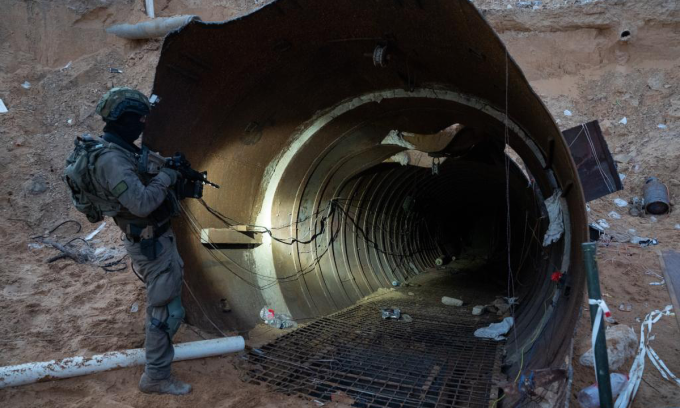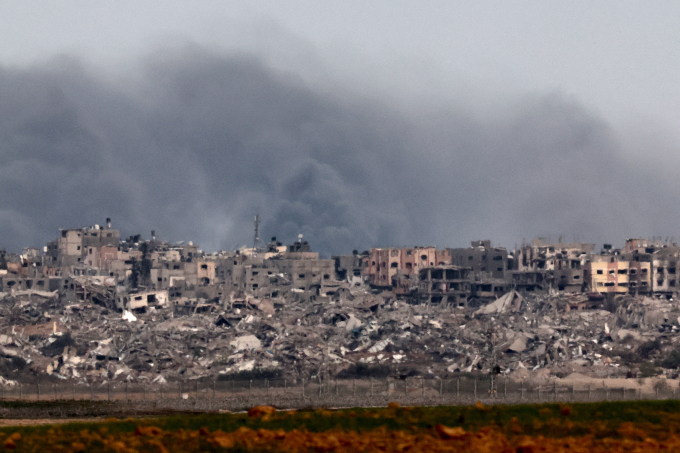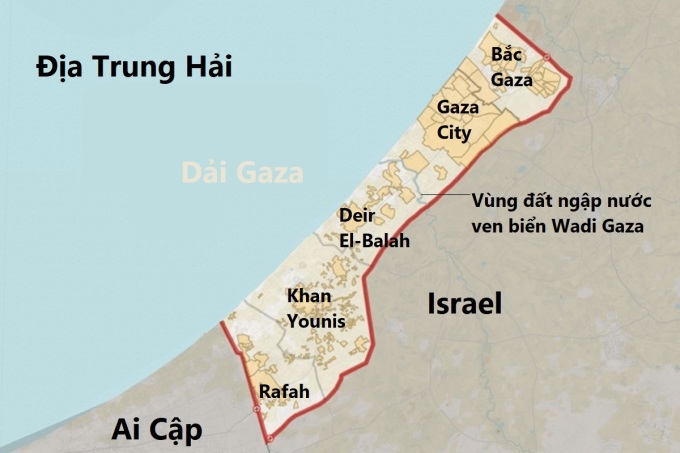Israel aims to "wipe out" Hamas and rescue all hostages, but after nearly four months of operations in Gaza, they have not yet completed any of their missions.
Israeli Prime Minister Benjamin Netanyahu met with the families of more than 130 hostages held by Hamas in the Gaza Strip in midweek. During the meeting at the Prime Minister's office in Jerusalem, the hostages' relatives asked Netanyahu to make the rescue of their loved ones the top priority in the war in Gaza, but he refused.
Since October 7, 2023, Prime Minister Netanyahu has said that Israel will only stop its Gaza campaign when it has achieved two main objectives: destroying Hamas’ military and administrative capabilities, and bringing all hostages home. But nearly four months on, Israel still sees no prospect of achieving both goals simultaneously.
Gadi Eisenkot, a member of Prime Minister Netanyahu's war cabinet, and many Israelis began to wonder whether these goals were impossible.
Michael Milshtein, a former Israeli intelligence official and now an expert on Palestinian issues, says Tel Aviv is facing a dilemma.
"We are facing two choices. One is to reach a full agreement with Hamas to free the hostages and withdraw. The other is to overthrow Hamas and govern the entire Gaza Strip. You have to choose," he said.
Senior leaders, including Prime Minister Netanyahu, Defense Minister Yoav Gallant and military commanders, have stressed the need to continue the operation, even as Israel has reduced the intensity of its attacks in Gaza. They say only military force can help rescue the hostages and oust Hamas from its grip on Gaza.
As Prime Minister Netanyahu has repeatedly said, Israel continues to strive for “complete victory.”
"We have reached long-term agreements with Hamas for one reason only, that they understand that there will be a high military price to pay. That is the effect of pressure. We need to use military force. It will not work if we rely on dialogue with them," said a senior Israeli military official.

Israeli forces discovered the entrance to a Hamas tunnel in northern Gaza in December 2023. Photo: IDF
But critics of Netanyahu’s strategy say the hostages cannot wait weeks, let alone years, in harsh conditions in Gaza detention facilities. Many also doubt whether Israel can topple Hamas in Gaza using its current strategy.
Up to now, despite deploying a large infantry force and many modern military technologies, Israel has not been able to detect any traces of three senior Hamas leaders including Yahya Sinwar, Mohammed Deif and Marwan Issa.
Hamas has stepped up its psychological warfare against Israel, releasing videos of the horrific conditions of its hostages and angering the Israeli public. Israeli leaders have stressed that both targets are of equal priority.
Hamas's attack in early October 2023 killed more than 1,100 Israelis, mostly civilians, and injured thousands.
In response to the Hamas offensive, some 300,000 reservists were called up to reinforce the Israel Defense Forces (IDF). Many of them have returned home in recent days as the IDF has scaled back its operations in Gaza.
Rear Admiral Daniel Hagari, an IDF spokesman, said there were currently three divisions operating in three separate areas in Gaza. The largest division was in the southern city of Khan Younis, where some Hamas leaders are believed to be hiding with hostages.
Mr Hagari stressed that rescuing hostages must be the primary objective of the military operation. Although the Israeli army could have carried out the operation against Hamas with much more firepower, it did not use all of that power.
"This is a time-consuming operation because we have to ensure the safety of our forces as well as the lives of hostages who may still be in the area," he said, referring to the operation in Khan Younis.
In northern Gaza, Hamas militants have reappeared after Israeli forces withdrew, causing concern among many.
"You left Gaza City, so how can you establish a post-conflict future if Hamas returns? Every place you leave, the situation can easily return to the way it was before the Israeli presence. So what does victory really mean?" Milshtein asked.
One reason for Israel's decision to withdraw was the risk of conflict with the Hezbollah militant group in Lebanon and the war against Hamas moving into a third, "low-intensity" phase.

Smoke rises during an Israeli offensive in the Gaza Strip in December 2023. Photo: AFP
The consequences of the campaign have been devastating. Israel's war against Hamas has left more than 26,000 people dead in Gaza and displaced 85% of the population. Large parts of Gaza have been left in ruins and aid groups have warned of a worsening humanitarian disaster.
The IDF estimates that Hamas has lost around 10,000 fighters out of a total of 30,000, with 17 of its 24 battalions disbanded, meaning Hamas can no longer operate as before. However, Milshtein said that does not mean Hamas has been completely defeated.
Instead of massing into large units to engage Israeli forces, Hamas has dispersed into small groups, deploying sniper fire, planting mines, and using anti-tank guns to inflict maximum damage on its opponents. Since the conflict began, about 220 Israeli soldiers have been killed and more than 1,000 wounded.
Hamas’s tunnel network, estimated to be more than 500 km long, has also challenged Israel’s efforts. The IDF has found about 1,600 tunnels and destroyed hundreds of them, but admits it cannot eliminate all of the vast network, but is trying to reduce its scope and hit key areas.
Israel is targeting critical infrastructure such as underground command and control centers, key passageways and weapons production facilities, according to Yaakov Amidror, a retired Israeli general and former national security adviser.
"I'm not sure if Israel has enough explosives to collapse the entire tunnel system," he said.
Dr Marina Miron warned that even if the upper layer of tunnels is destroyed, Hamas may still have a deeper layer of the tunnel network to continue operating.

Location of Gaza City and other areas in the Gaza Strip. Graphic: Al Jazeera
South Africa accused Israel of genocide at the International Court of Justice, saying the Jewish state's leaders deliberately targeted Palestinian civilians and civil society, a claim Tel Aviv denies.
"In nearly four months of bombardment of Gaza, what Israel has achieved is largely to make the strip of land uninhabitable," said Nur Arafeh, a research fellow at the Carnegie Middle East Center in Beirut, Lebanon.
Thanh Tam (According to FT, The Media Line, CBC )
Source link



![[Photo] Keep your warehouse safe in all situations](https://vphoto.vietnam.vn/thumb/1200x675/vietnam/resource/IMAGE/2025/10/1/3eb4eceafe68497989865e7faa4e4d0e)

![[Photo] Hanoi morning of October 1: Prolonged flooding, people wade to work](https://vphoto.vietnam.vn/thumb/1200x675/vietnam/resource/IMAGE/2025/10/1/189be28938e3493fa26b2938efa2059e)
![[Photo] President of the Cuban National Assembly visits President Ho Chi Minh's Mausoleum](https://vphoto.vietnam.vn/thumb/1200x675/vietnam/resource/IMAGE/2025/10/1/39f1142310fc4dae9e3de4fcc9ac2ed0)




















































































Comment (0)